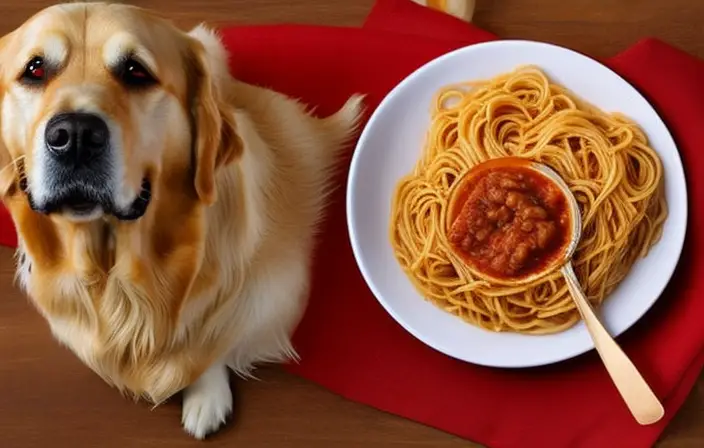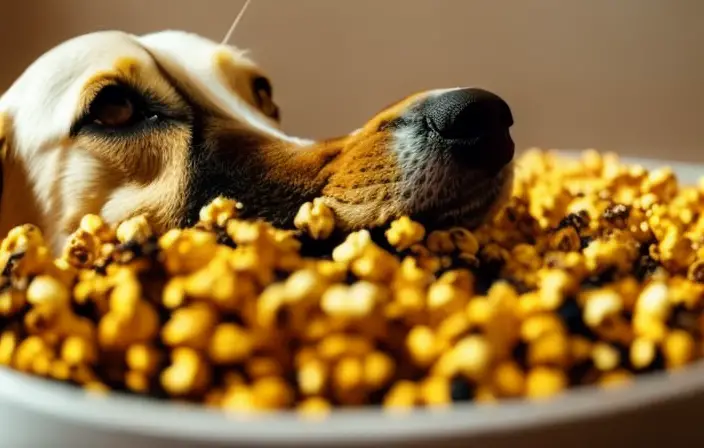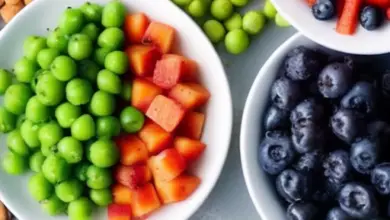Can Dogs Eat Spaghetti Noodles
Are you wondering if your furry friend can indulge in some spaghetti noodles? Well, the answer is… drumroll please… yes, they can!
While dogs mainly thrive on a balanced diet of dog food, incorporating cooked spaghetti noodles into their meals occasionally can be a tasty and enjoyable treat. However, it’s important to know the health benefits and potential risks involved.
In this article, we’ll delve into the dos and don’ts of feeding spaghetti noodles to your beloved pup. So buckle up and let’s dig in!
Key Takeaways
- Incorporating small amounts of cooked spaghetti noodles into a dog’s diet can provide certain health benefits, as they contain carbohydrates that serve as a source of energy and essential vitamins and minerals.
- Feeding spaghetti noodles to dogs can pose potential risks, such as choking, and they offer little nutritional value and lack essential nutrients for dogs.
- Whole wheat or gluten-free alternatives can be considered for incorporating pasta into a dog’s diet, and it is important to consult with a veterinarian before introducing any new food.
- Safe preparation of spaghetti noodles for dogs includes serving size control, cooking without seasonings or sauces, avoiding excessive sodium intake, cooking until al dente, and adding lean proteins for nutritional value.
Health Benefits of Spaghetti Noodles for Dogs
Spaghetti noodles can provide some health benefits for dogs when eaten in moderation. While dogs are primarily carnivores, incorporating small amounts of cooked spaghetti noodles into their diet can offer certain advantages.
However, it is important to note that some dogs may have potential allergies to wheat or gluten, which are commonly found in pasta. If your dog shows any signs of discomfort after consuming spaghetti noodles, such as itching, digestive issues, or skin irritations, it is best to consult with a veterinarian.
In terms of nutritional value, spaghetti noodles contain carbohydrates that can serve as a source of energy for your furry friend. Additionally, they also provide essential vitamins and minerals like iron and B vitamins. However, it is crucial to remember that dogs require a balanced diet consisting mainly of protein from meat sources.
When feeding spaghetti noodles to your dog, make sure they are plain and do not contain any sauces or seasonings which may be harmful to them. Cook the noodles thoroughly and let them cool before serving them in small portions alongside their regular meals.
Always prioritize your dog’s well-being by monitoring their intake and consulting with a vet if you have any concerns.
Potential Risks of Feeding Spaghetti Noodles to Dogs
Feeding spaghetti noodles to your furry friend can pose potential risks. While dogs can eat certain human foods in moderation, it’s essential to be aware of the potential hazards associated with feeding them spaghetti noodles. One of the main risks is choking. The long, slippery strands of spaghetti can easily get lodged in a dog’s throat, leading to a life-threatening situation. It’s crucial to cut the noodles into smaller pieces or opt for alternative options that are easier for your pup to chew and swallow.
Additionally, while spaghetti noodles may seem harmless, they offer little nutritional value for dogs. Dogs require a balanced diet that consists primarily of protein and healthy fats. Spaghetti noodles are mainly composed of carbohydrates and lack essential nutrients that dogs need for optimal health.
If you still want to incorporate pasta into your dog’s diet, consider using whole wheat or gluten-free alternatives. These options provide more fiber and nutrients compared to regular spaghetti noodles. However, it’s always best to consult with your veterinarian before introducing any new food into your dog’s diet.
How to Safely Prepare Spaghetti Noodles for Dogs
When preparing spaghetti for your furry friend, it’s important to take certain precautions.
Dogs can enjoy spaghetti noodles as a part of their diet, but there are some factors to consider. First and foremost, serving size is crucial. While a small amount of cooked plain spaghetti noodles can be given as an occasional treat, it should not exceed 10% of your dog’s daily caloric intake.
Cooking methods also play a significant role in ensuring the safety of feeding spaghetti to dogs. It is essential to cook the noodles without any seasonings or sauces that may contain harmful ingredients like garlic or onions, which can be toxic to dogs. Additionally, avoid using salt when boiling the pasta water as excessive sodium intake can lead to health issues.
To prepare spaghetti for your furry companion, cook the noodles until they are al dente and then drain them thoroughly before serving. You can even mix in some lean protein like boiled chicken or turkey for added nutritional value. Remember always to let the noodles cool down before offering them to your pup.
Alternatives to Spaghetti Noodles for Dogs
If you’re looking for other options, there are several pasta alternatives that can be a safe and nutritious choice for your furry companion. While dogs can eat spaghetti noodles in moderation, it’s always good to have some healthy pasta options on hand.
Homemade pasta recipes for dogs are a great way to ensure that your pup is getting a balanced and tasty meal.
One popular alternative to traditional wheat-based pasta is using vegetable noodles. Zucchini, sweet potato, and butternut squash can all be spiralized or thinly sliced to create noodle-like shapes. Not only do these veggies add a nutritional boost with vitamins and fiber, but they also provide a satisfying crunch that dogs love.
Another option is to use grain-free or gluten-free pasta made from alternative flours like chickpea or quinoa. These types of pastas are often higher in protein and lower in carbohydrates compared to traditional wheat pasta. They come in various shapes and sizes, making them versatile for different recipes.
When making homemade pasta for dogs, avoid using ingredients like onions, garlic, or excessive amounts of salt as they can be harmful to their health. Instead, focus on incorporating lean proteins like chicken or turkey along with dog-friendly vegetables such as carrots and peas.
Tips for Incorporating Spaghetti Noodles Into Your Dog’s Diet
To introduce spaghetti noodles into your pup’s diet, consider mixing them with lean proteins and dog-friendly vegetables for a well-rounded meal. Here are some tips to help you incorporate spaghetti noodles into your dog’s diet:
-
Portion Control: When feeding spaghetti noodles to your dog, it’s important to keep portion sizes in mind. Dogs have different nutritional needs than humans, so be sure to give them an appropriate amount based on their size and activity level.
-
Benefits of Homemade Dog Food: By making your own dog food at home, you have greater control over the ingredients and can ensure that your furry friend gets all the necessary nutrients. Homemade meals can also be more cost-effective in the long run.
-
Nutritional Additions: To make spaghetti noodles more nutritious for your dog, consider adding lean proteins like chicken or turkey, which provide essential amino acids for muscle development. You can also mix in dog-friendly vegetables such as carrots or peas for added vitamins and fiber.
-
Consult with Your Vet: Before making any changes to your dog’s diet, it is always a good idea to consult with your veterinarian. They can provide guidance specific to your pup’s needs and give you personalized recommendations.
Frequently Asked Questions
Can Dogs Eat Spaghetti Noodles That Are Flavored With Garlic or Onions?
Feeding dogs spaghetti noodles flavored with garlic or onions can be harmful. These ingredients are toxic to dogs and can cause anemia or damage their red blood cells. Opt for dog-friendly alternatives like plain pasta.
Are There Any Specific Health Conditions That Dogs With Sensitive Stomachs Should Avoid Eating Spaghetti Noodles?
If your dog has a sensitive stomach, it’s best to avoid feeding them spaghetti noodles. While there are no specific health conditions to avoid, the potential risks and side effects may include digestive upset or discomfort. Consider exploring dog food alternatives instead.
Can Dogs Eat Spaghetti Noodles With Tomato Sauce?
Spaghetti noodles with tomato sauce can be given to dogs in moderation. However, it’s important to remove any spices or garlic from the sauce as they can be harmful. Cook the noodles plain and serve them as a treat occasionally.
Are Whole Wheat Spaghetti Noodles Healthier for Dogs Than Regular Spaghetti Noodles?
Whole wheat spaghetti noodles may be healthier for your dog than regular spaghetti noodles. However, it’s important to consider potential risks of feeding dogs any type of pasta, such as digestive issues or weight gain.
Can Dogs Eat Spaghetti Noodles That Are Mixed With Vegetables or Meat?
Yes, dogs can eat spaghetti noodles that are mixed with vegetables or meat. However, it is important to ensure that the ingredients are safe for dogs and avoid adding any seasonings or sauces that could be harmful. There are also alternative pasta options available specifically made for dogs.
Conclusion
In conclusion, while spaghetti noodles can provide some health benefits for dogs, it’s important to be aware of the potential risks they pose.
By safely preparing and incorporating them into your dog’s diet, you can ensure their well-being. However, it’s crucial to consider alternatives that may be more suitable for your furry friend’s digestive system.
Remember, a balanced diet tailored specifically for dogs is key to their overall health and happiness. So make informed choices and prioritize your dog’s well-being above all else.

If Richie Bedard is a dog food expert, author, or any other figure in the field of dog nutrition that emerged after September 2021,






